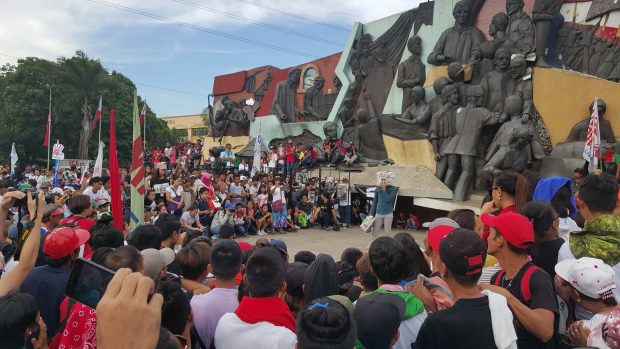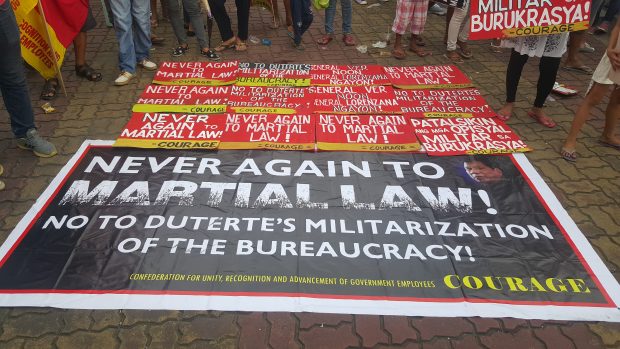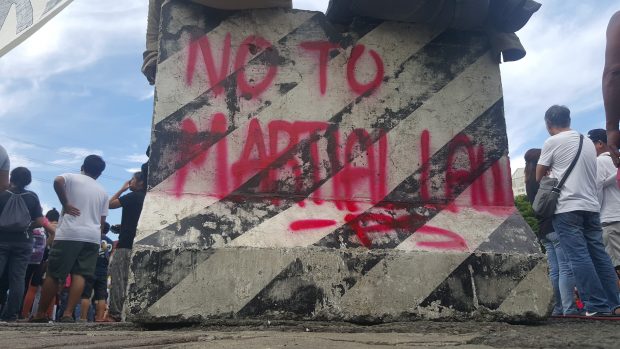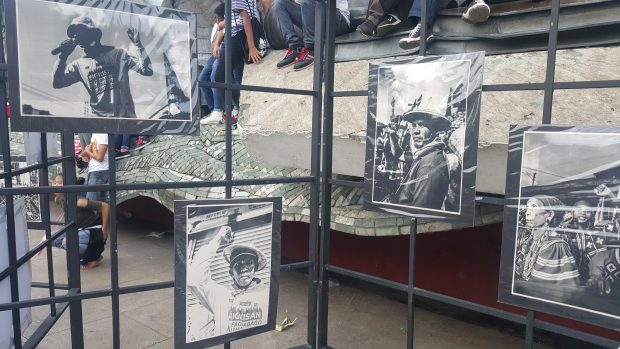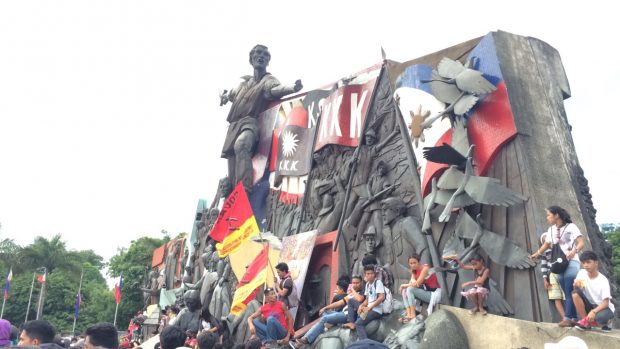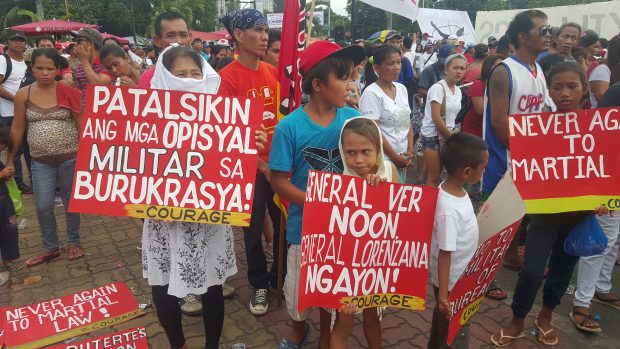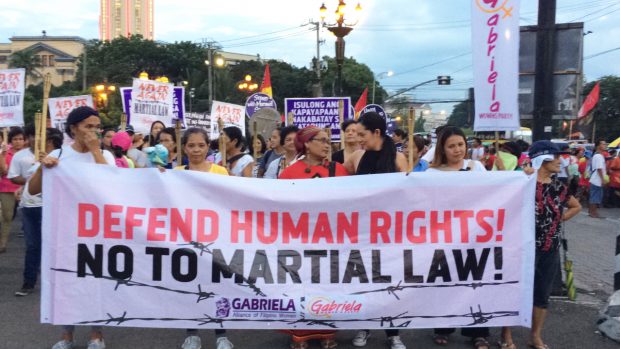A special report by Raymund B. Villanueva
WARRIOR Datu Jemboy Mandagit was among the leaders of the 40,000-strong rally outside the House of Representatives summoned by President Rodrigo Duterte for an audience with him after his first State of the Nation Address (SONA).
Like tens of millions of Filipinos, the young Warrior Datu thought change would finally come or, at least, the Lumad killings would stop. It was after all a campaign promise fellow Mindanaoan Duterte uttered several times in the past months.
Along with 3,000 fellow Lumads and peasants from all over Mindanao, Datu Jemboy went to Manila hoping to witness peace dawning in the Lumad’s ancestral domains. He remembers the exact moment in the SONA when Duterte declared a unilateral ceasefire with the New People’s Army, the revolutionary group Mandagit was falsely accused of being a member. It was totally unexpected then that yet another nightmare would visit Datu Jemboy’s community shortly after, one that would again send his own people scampering for safety.
Five days after the President’s SONA, Datu Jemboy’s community was attacked. A pregnant woman and the child in her womb was killed while seven others were injured.
Just a day after the indigenous leader of a very remote community met Duterte within the enclave of the country’s political elite, Alde “Butsoy” Salusad, leader of the so-called New Indigenous People’s Army for Reform (NIPAR), had been circling Datu Jemboy’s territory. He spent three days at nearby Sitio Spring, looking for Datu Jemboy and issuing threats.
A traditional Tigwahanon Manobo wedding was being celebrated at Datu Jemboy’s community of Sitio Tibugawan, Barangay Kawayan in San Fernando, Bukidnon that Saturday morning of July 30. But the day started uneasy.
A tragic wedding
At dawn, Butsoy appeared on a hill near Sitio Tibugawan and accosted residents Jason Pangantagan, 35 years old; Okking Sidon, 20; and his own relative Jaime Salusad, 40. He ordered the three tied up and barked a forbidding threat: “If I do not kill Jemboy or I do not kill anyone in Tibugawan today, it would have to be you three.”
Butsoy then approached the community, accompanied by 12 members of the Civilian Auxilliary Force Geographical Unit (CAFGU) under the 68th Infantry Battallions of the Philippine Army, among them a certain Ronald Cabantao. They were wearing jungle fatigues and was armed to the teeth.
Before they could enter the community, they came across Barangay Kawayan Indigenous Peoples’ Mandatory Representative (IPMR) Arnold Manhura who begged him not to proceed to Sitio Tibugawan and let the wedding celebration be. Butsoy told him he and his band won’t be long. They would only be in the sitio for 10 short minutes, he said. The IPMR, frightened by the menacing men and guns before him, assented.
Then shots rang out at nine o’clock that morning.
Makinit Gayoran, six months pregnant and carrying her nine-month old baby, was killed when a bullet pierced her torso. Seven others were wounded, five of whom were minors and students of the Rural Missionaries of the Philippines-Northern Mindanao Region Literacy and Numeracy School. Two other community members, Kambo Bangonan and Boras Sedong, were also wounded in the incident. A 60-year old indigenous leader was the eighth victim, Datu Daparapa, who was hit on his right toe.
Witnesses saw Butsoy was among those who peppered the house where the celebration was being held with submachine gun fire for 10 minutes from 50 meters away. Eighty families of Sitio Tibugawan and nearby communities fled and are now encamped at the Bukidnon Provincial Capitol grounds in Malaybalay City.
Duterte’s short-lived ceasefire order was in effect when Butsoy and the government forces killed Gayoran and her child and injured seven others.
It was only 11 days after the incident that Datu Jemboy was able to go back to Bukidnon. He first saw his wife Pedela and their infant son again at the Bukidnon Provincial Hospital, the boy having gotten sick at the encampment.
Warrior Datu for peace
Datu Jemboy is but 25 years old. He took on life at a young age, customary among the Tigwahanon Manobos.
He entered into an arranged marriage with his wife Pedela when he was 10 years old and she, nine years old. They have five sons, the eldest now 11 and the youngest still an infant.
As soon as he could trek the treacherous paths to other communities, his paternal grandfather Ramun Mandagit took him along to teach him the ways of a Warrior Datu. The elder Mandagit has annointed him as his successor, a mantle he took in 2005 when Datu Ramun died.
“Ako ang tanging pinili ng 11 na Tribal Datus ng aming lugar, kasi iyon ang gusto ni Datu Ramun. Ako lang ang sinanay niya na susunod na Warrior Datu,” Datu Jemboy said (I was unanimously elected by the 11 Community Datus of our territory, because it was the wish of Datu Ramun. I was the only one he trained to be his successor.)
He now leads 11 communities that straddle Bukidnon and Davao City under the indigenous organization KASILO (Kaugalingong Sistema sa Igpasasindog to Lumadnong Ogpaan, a Lumad organization in Bukidnon) with around 4,000 individual members.
A Warrior Datu must be brave, Datu Jemboy said. He must be willing to scale mountains and ford rivers even at night to settle disputes as soon as possible. He must be able to gather the community Datus regularly and unite them in major decisions.
“Maraming problema ang inaayos ng Warrior Datu. May patayan, agawan ng asawa, agawan ng lupa,” Datu Jemboy said. (There are many problems that need a Datu Warrior’s attention. These range from killings, wife-snatching, landgrabbing.) Datu Jemboy succeeds in placating the agrieved parties with traditional preferred defrayals such as horses and hunting rifles. When an agreement is reached, he leads both parties and the communities in the panumpa (pledging) and tampuda (peace pact). “Iyan, hindi na mababali,” Datu Jemboy said. (The panumpa and tampuda are inviolable.)
There has not been a dispute that has escalated into a clan or tribal war among the 11 Tigwahanon Manobo communities of San Fernando and Davao in Datu Jemboy’s 11-year leadership. Neither has he gone to war with other tribes. He has made his Warrior Datu title a misnomer.
Datu of the mountains
But Tigwahanon Manobos—originally a riverine tribe but who have been driven up the mountains over the years—have not been been left in peace by outsiders for a long time now. Their peace is often shattered by incursions of logging and mining companies as well as the militarization that invariably accompanies them.
Two mining companies, San Christo Mineral Exploration Corporation and Apex Mining Company, Inc. had explored for gold in Datu Jemboy’s ancestral lands. This, after outsiders learned that gold nuggets are often found in Tigwahanon Manobo’s streams and rivers.
Datu Jemboy’s community has consistently stood up against mining. Roger Plana, secretary general of the Kalumbay Regional Lumad Organization, said their opposition became even stronger after Butsoy killed then KASILO vice-chairperson Datu Jimmy Liguyon in March 2012.
Liguyon, a Matigsalug Manobo and Barangay Captain of Dao in San Fernando was killed in front of his house. Butsoy, a relative of Liguyon, has repeatedly boasted it was him who killed the Datu and government official.
The Philippine government has been using Lumad to sow terror among fellow Lumad. The Gloria Macapagal Arroyo government launched its Investment Defense Force with rebel-surrenderees and Lumad armed groups acting as private armies for mining, logging and plantation companies. This gave rise to the proliferation of paramilitary groups such as Alamara, Magahat-Bagani Force and Salusad’s NIPAR. They also function as auxilliaries to the Armed Forces of the Philippines’ counterinsurgency program euphemistically called the Oplan (Operation Plan) Bayanihan-Internal Security Plan. In exchange for their mercenary activities, they are enticed with regular pay or small mining activities they themselves could operate.
In Salusad’s case, he is allowed to collect commissions from San Fernando’s gold mining and trade. He is even called a “peacemaker” by government agencies, awarding him with a mantle of legality and respectability despite multiple criminal charges for murder.
But while Butsoy seems to have his way with the AFP and the Philippine National Police, he is vigorously opposed by other Lumads.
“Pinoprotekhan namin ang aming mga bundok at gubat dahil ito ang aming ospital at palengke. Sa mga ito namin kinukuha ang aming mga gamot kapag kami ay nagkakasakit at dito rin namin kinukuha ang marami sa aming pagkain. Wala namang ospital na malapit sa amin,” Datu Jemboy said. (We protect our mountains and forests because these are our hospital and marketplace. We gather our medicines from these when we get sick, and many of our food. There are no hospitals near our communities.)
On their farmlands, the Tigwahanon Manobos plant upland rice, bananas and root crops like cassava and sweet potatoes. They gather and process the fiber from wild abaca plants as one of their main cash products. They are financially poor but they do not bother the government too much about their simple existence. Mostly, they just want to be left alone.
Warrior Datu in the cities
Following intense militarization in their communities in July 2015 and Butsoy’s many threats against him, Datu Jemboy led his people in a forced evacuation to the United Church of Christ in the Philippines compound in Haran, Davao City.
In Davao City, Datu Jemboy became one of the main leaders and spokesperson of the various groups that have sought shelter at the evacuation center. His leadership qualities shone when he took on the likes of North Cotabato Representative Nancy Catamco who led police-aided raids at the Haran sanctuary to force the Lumads back to their communities.
“Magaling magsalita si Datu Jemboy, hindi nahihiya. Marunong siyang mag-Cebuanon at mag-Filipino. Hindi rin siya natatakot sa psychological warfare ng militar at ni Butsoy,” Plana said of the Datu. (Datu Jemboy is a good speaker and is not shy. He knows Cebuano and Filipino. He is not afraid of the threats and the psychological warfare against him by the military and Butsoy.)
Plana adds that the Lumad are often seen as timid by lowlanders. But Datu Jemboy has transcended their usual shyness because he is defending his people and their ancestral domain.
“Kasi, kung wasak na ang bundok at wala nang mga puno, wasak na rin ang kultura naming mga katutubo. Sa aming lupang ninuno namin pina-praktis ang aming kultura, politika at ekonomiya. Hindi na kami pwedeng tawaging Lumad kung sa basurahan na kami nakatira,” Plana said. (If the mountains are destroyed and our forests are gone, our cultures are also destroyed. We can only practice our cultural, political and economic traditions in our ancestral domains. We cannot be called Lumads if we already live in garbage dumps.)
It was not only in Davao City that Datu Jemboy displayed his mettle. He was among the Datus who led the cross-country Manilakbayan 2015 and 2016 that travelled from the hinterlands of Mindanao to Metro Manila, the political and economic center of the country. On the streets of the seething capital, the Lumad forced millions of Filipinos to become aware of their struggles and their bravery. Never will the Lumad’s defense of their ancestral lands be ignored again.
On December 20, 2015, Datu Jemboy led his people back to Sitio Tibugawan in the hope that they could go back to their lands in peace. They cleared the farms and planted rice and corn. Then El Niño withered their crops away until a State of Calamity had to be declared. Still, the Tigwahanon Manobos tried to rebuild and hoped to live in peace.
And then July 30 happened.
This time, Datu Jemboy said they will not go back to San Fernando while Butsoy remains free. He still leads the resistance against accusations by Bukidnon Governor Jose Maria Zubiri that their forced evacuation is fake.
“Sabi pa sa amin, bayaran na lang daw ng P150,000 yung pamilya ng namatay at P25,000 ang ibibigay naman sa mga nasugatan. Hindi lamang pera ang kapalit ng aming buhay. Kailangang hulihin ng mga pulis si Butsoy. Nasa Sitio Kiranggol lang siya,” Datu Jemboy said. (We were even told that they will just give P150,000 to the family of the killed victim and P25,000 for each of the injured. Money cannot compensate for the lost lives of our tribes people. Butsoy must also be arrested. He is just in Sitio Kiranggol.)
In April 2012, a local court issued a warrant of arrest against Butsoy for the murder of Liguyon but authorities have not arrested him.
The Tigwahanon Manobos’ Warrior Datu’s voice rings clear: “Ipapakita namin kay Governor Zubiri na hindi kami buang para mag-bakwit sa syudad ng walang dahilan. Lalaban kami sa kanila. Hindi kami papayag na patayin nila kami sa gutom at walang kalaban-laban.” (We will show Governor Zubiri that we are not crazy to evacuate to the city without reason. We will fight them. We will not allow them to just kill us by hapless starvation without giving a fight.) #
= = = = = = =
This special report was originally published by the MINDANAO INTERFAITH INSTITUTE FOR LUMAD STUDIES with the assistance of the European Union. The contents of this publication are the sole responsibility of the RMP-NMR Inc and the “Healing the Hurt” Project partners and can in no way be taken to reflect the views of the European Union.
MINDANAO INTERFAITH INSTITUTE FOR LUMAD STUDIES is part of the Healing the Hurt Project supported by the European Union.

